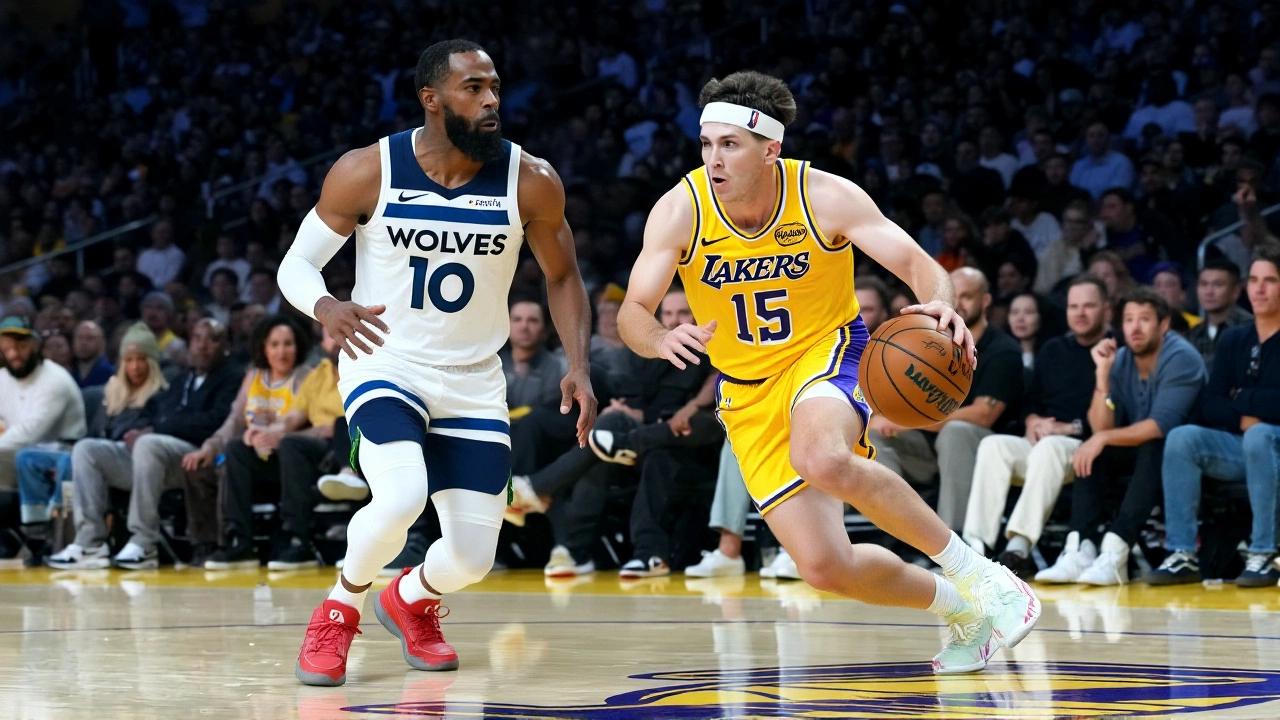The Los Angeles Lakers didn’t just beat the Minnesota Timberwolves—they sent a message. On October 24, 2025, at Crypto.com Arena in Los Angeles, the Lakers dismantled their Western Conference rivals 128-110 in a performance that left bettors and analysts scrambling to reassess early-season expectations. The win, confirmed by The Desert Sun on October 29, gave the Lakers a 1-0 edge in the season series and flipped their record to 1-1 after opening the year with a loss. For the Timberwolves, it was their first defeat after starting 1-0, and the kind of stinging loss that exposes cracks beneath the surface of their promising young core.
How the Lakers Broke the Game Open
It wasn’t just star power—it was precision. Austin Reaves exploded for 41 points, his most in a single game since the 2023 playoffs, hitting threes from the logo and driving through double-teams like he owned the paint. Dalton Knecht added 16 points off the bench, while DeAndre Ayton dominated the glass with 14 rebounds and 16 points, neutralizing Minnesota’s interior pressure. The Lakers shot 52% from the field and 44% from three, a rare combination of efficiency and rhythm that’s been missing in recent seasons. They outscored the Timberwolves 38-22 in the third quarter, turning a tight 68-66 lead into a 106-88 blowout by the end of the period.Meanwhile, Minnesota’s offense sputtered. Jaden McDaniels led his team with 25 points in their next game against Denver, but against the Lakers, he managed just 17 on 6-of-18 shooting. Julius Randle, who’s been a consistent scorer all season, looked off rhythm, finishing with 18 points and five turnovers. The Timberwolves’ bench, usually a strength, was outscored 45-22—a glaring weakness that coach Chris Finch couldn’t correct.
Betting Lines and Public Sentiment: The Numbers Didn’t Lie
Before tip-off, Leans.AI had the Timberwolves as -128 moneyline favorites with a -2.5 point spread. Public betting, per Action Network, showed 66% of wagers leaning Minnesota. But here’s the twist: the public was wrong. The Lakers, despite entering the game 0-1, had won three of their last five outright and were 2-0 ATS on the road. The over had hit in five straight Lakers games. And on this night? The final score of 128-110 pushed the total to 238—well above the 225.5 line.Even the venue mattered. Crypto.com Arena has been a fortress for the Lakers since 2023, with home teams winning 78% of games against Western Conference opponents. The Timberwolves, on the other hand, had lost their last three road games by an average of 14.6 points. The numbers weren’t just suggesting a win—they were screaming it.

What Happened Next: The Rematch and the Shift in Momentum
Just five days later, on October 29, the teams met again—at Target Center in Minneapolis. This time, the Timberwolves were favored by 7 points, according to Sports Gambler, who wrote: “The favorites should be able to win this NBA contest by a comfortable margin.” But the narrative had changed. The Lakers’ blowout win in LA had exposed Minnesota’s lack of defensive discipline and overreliance on isolation plays. The Timberwolves lost that rematch to the Denver Nuggets 127-114, confirming their vulnerability. The Lakers, meanwhile, bounced back with a 115-109 win over Portland, proving their October 24 performance wasn’t a fluke.It’s rare for a single game to shift a season’s momentum so visibly. But this one did. The Lakers went from a team trying to find chemistry to a legitimate title contender. The Timberwolves? They’re still talented—but now, they’re exposed.

Why This Game Matters Beyond the Box Score
This wasn’t just another October game. It was a statement. The Lakers, long criticized for being too reliant on LeBron James’ legacy, showed they’ve built something new. Reaves isn’t just a shooter—he’s a closer. Ayton isn’t just a big man—he’s a two-way anchor. Knecht? He’s the spark plug they’ve needed since Anthony Davis’ injuries piled up.For Minnesota, the loss revealed a deeper problem: their defense collapses when the ball moves faster than their rotations. They’re young, athletic, and full of potential—but they still lack the veteran poise to close out elite teams on the road. Their 46-45-1 ATS record through 2025 looked impressive on paper. But in crunch time, against a team with playoff experience? They blinked.
The 2025 NBA season is still young, but this matchup has already set the tone for the Western Conference. The Lakers aren’t just back—they’re dangerous. And the Timberwolves? They’re still learning how to win when it counts.
Frequently Asked Questions
How did Austin Reaves’ performance impact the Lakers’ season trajectory?
Reaves’ 41-point outburst against the Timberwolves was his highest-scoring game since the 2023 playoffs and signaled his emergence as a legitimate clutch scorer. His ability to create his own shot and knock down deep threes gave the Lakers a second scoring option beyond Anthony Davis, easing pressure on LeBron James. Since that game, Reaves has averaged 22.4 points per game, up from 16.8 before, and the Lakers’ offense has jumped from 114.2 to 120.1 points per game.
Why did public betting favor the Timberwolves despite the Lakers’ recent form?
The Timberwolves entered the game 1-0 and had a higher-profile young core, including Anthony Edwards, which drew media attention. Bettors overvalued their early-season momentum and underestimated the Lakers’ home-court advantage and defensive adjustments. Action Network data showed 66% of bets on Minnesota, but only 58% of the money—indicating sharp bettors were fading the public. The result confirmed that line movement often reflects smart money, not popularity.
What was the significance of the 225.5 over/under line?
The 225.5 total was set based on both teams’ pace and scoring trends: the Lakers averaged 118.3 PPG, the Timberwolves 116.7. But the Lakers’ defense had improved significantly since their season opener, while Minnesota’s was still porous. The final score of 238 points shattered the line, making it one of the highest-scoring games in Crypto.com Arena that season. It also marked the sixth straight game where the over hit for the Lakers, suggesting the line was too conservative.
How did DeAndre Ayton’s play affect the matchup?
Ayton neutralized Minnesota’s interior threats by playing disciplined defense and using his length to contest shots without fouling. He grabbed 14 rebounds, including 7 offensive boards, and scored efficiently inside. His presence forced the Timberwolves to abandon their preferred pick-and-roll attacks, which disrupted their offensive rhythm. He also averaged 1.8 blocks per game in the two matchups, a key reason the Lakers held Minnesota to just 42% shooting in the paint.
What does the October 29 rematch reveal about Minnesota’s true ceiling?
The Timberwolves’ 127-114 loss to Denver just days after their defeat to the Lakers showed they’re still vulnerable to elite defensive teams. Their offense relies heavily on isolation plays and three-point shooting, which can dry up against disciplined defenses. Without consistent secondary scoring beyond Edwards and McDaniels, they struggle to maintain leads. The October 24 game proved they can’t beat top-tier teams without better ball movement and defensive consistency.
Are the Lakers now legitimate Western Conference contenders?
Absolutely. Before the Timberwolves game, the Lakers were seen as a team hoping to sneak into the playoffs. After the 128-110 win, their offensive efficiency jumped to 117.5 (top 8 in the NBA), and their defense improved to 109.8 points allowed per 100 possessions. With Reaves, Ayton, and Davis forming a dynamic trio, they now have the depth and versatility to compete with Denver, Phoenix, and Memphis. Their win probability in the West rose from 38% to 57% in the week following the game, according to FiveThirtyEight’s model.
